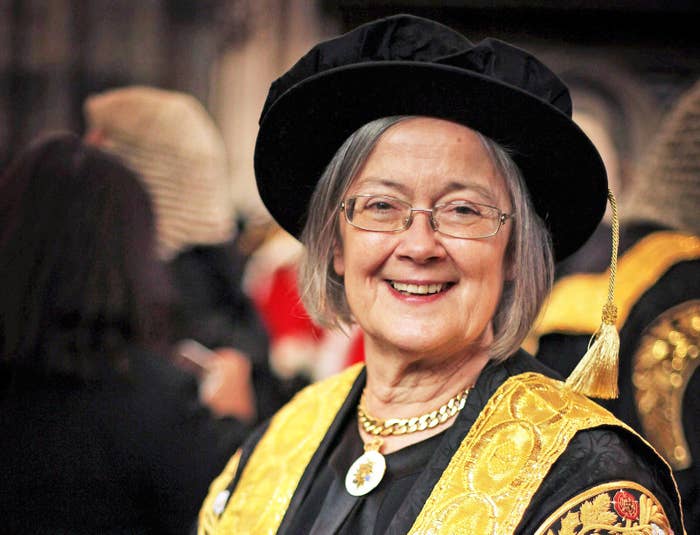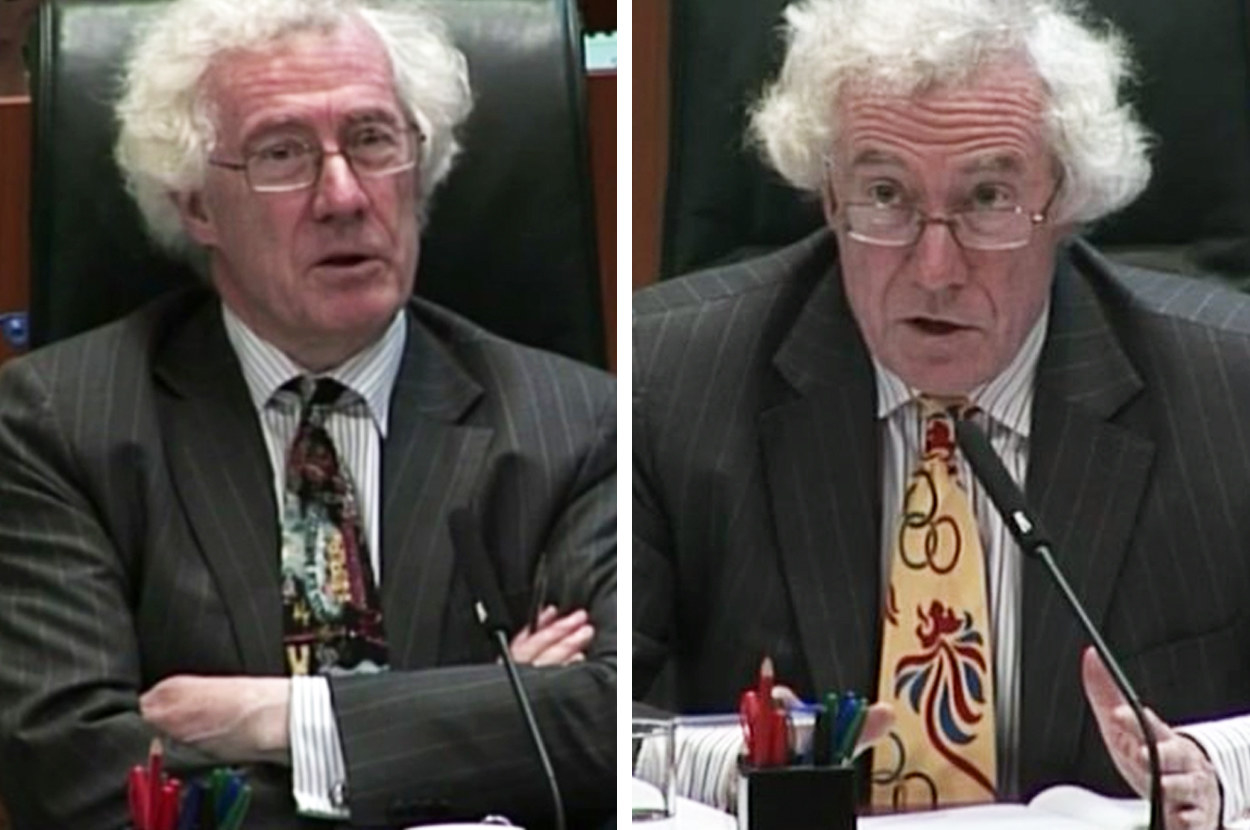
Britain's highest court is set to be headed by a woman for the first time, but the appointment will run into fierce opposition from right-wing tabloids and MPs.
Lady Brenda Hale, currently the second-ranking judge on the Supreme Court, is hotly tipped to become its president when the incumbent, Lord Neuberger, retires later in the year. It is one of several impending appointments that will drastically change the makeup of the country's top appeal court.
Hale is regarded in legal circles as an experienced and capable judge, and her promotion would be welcomed by many at a time when the judiciary is trying to make its senior ranks less white, male, and privileged.
But she is "wildly unpopular" in the conservative press because of her liberal views and her nomination would spark an outcry, senior Fleet Street sources said.
At the Daily Mail, Hale is "absolutely hated" because of her rulings and public statements on marriage, human rights, and privacy, according to a source familiar with the thinking of its editor, Paul Dacre.
Asked whether the Mail and Sun would rally against her promotion to chief justice if she is nominated, the insider said: "No question."
There would also be opposition on the Conservative back benches. "This appointment will do little to rehabilitate the reputation of the senior judiciary with the majority of the British public they are there to serve," said Andrew Bridgen, the Conservative MP for North West Leicestershire.
The president of the Supreme Court is the most senior judge in the country. The chief justice typically leads the court on the most important cases, helping to shape English law, but also acts as a figurehead for the judiciary.
In addition to finding a new president to replace Neuberger, the court will recruit three new justices to fill vacancies created by retirements. The replacement of a quarter of the court in one swoop is unprecedented, and gives it an opening to promote judges from a wider range of backgrounds. Of the current line-up, all 11 are white, 10 are male, and 9 studied at Oxford or Cambridge.
The search comes at a time when the judiciary is under more political pressure than ever because of its role in the Brexit debate.
In November, a ruling by the High Court that Theresa May's government couldn't lawfully begin the process of withdrawing from the European Union without permission from parliament prompted intense hostility from prominent Eurosceptics, who accused the judges of trying to frustrate democracy.
On one of the most notorious newspaper front pages of recent times, the Mail declared that the High Court judges who heard the case were "enemies of the people". When the government appealed the court's ruling, the newspaper launched a pre-emptive attack on the Supreme Court justices, accusing several of pro-European bias.

Hale was harshly criticised in the Daily Express and other newspapers after she discussed aspects of the case at a legal event in Malaysia, which her critics said was a breach of the requirement for judges to be impartial. "Quite what gives her the right to make such comments ... only she knows," the Mail said in an editorial.
In another piece, the Mail gave Hale a "europhile rating" of 5 out of 5.
The Mail's antipathy to Hale goes back a lot further than the Brexit case, sources close to the paper said.
In 13 years on the highest court, during which she has been the lone female, Hale repeatedly irked the newspaper's editors and commentators with her rulings and public statements on equality and human rights.
"Christ, just look at the cuttings," one insider said. Over the years, the paper has referred to her as the "marriage wrecker," a "radical feminist", and "Brenda the battleaxe".
The paper's main objection has been her influence over family law, first on the Law Commission (the government body that reviews laws) and then as a judge specialising in family cases. According to her critics, she is to blame for weakening the legal status of traditional marriage over many years.
Hale's views about privacy have also provoked hostility among editors. She is, as one put it, one of a group of judges who have tightened the law to give people in the public eye more protection from intrusion, which has undermined newspapers' freedom to report.
One prominent example: In May last year, Hale and four other Supreme Court judges ruled that the Sun on Sunday could not name a married celebrity who took part in a threesome, even though the identity was already widely circulating on the internet.
Despite her critics, Hale is well-regarded in legal circles. Over her long career as an academic, legal reformer, and judge, she is credited with the introduction of greater protections for children, mental health patients, and victims of domestic violence. And as the lone female on the court for more than a decade, she has championed greater rights for women. She has regularly ruled against the government in human rights cases.
In a piece last week, the Guardian columnist Anne Perkins said Hale has "politely jolted the thinking of her peers on to a different track" after the court ruled that a Northern Irish woman could claim her deceased partner's pension even though they weren't married.
"She's very well-respected" within the legal profession, said James Lee, a lecturer in law at King's College London.
The Supreme Court declined to comment on the potential backlash. “Under the requirements of the Constitutional Reform Act 2005, the independent selection commission makes its recommendations to the Lord Chancellor based solely on the merits of the candidates who apply,” a spokesperson said.
In Britain, the process for appointing Supreme Court justices is less overtly political than it is in the United States.
In America, the top appeal justices are nominated by the president and then have to be confirmed by the Senate. In the UK, however, appointees for the Supreme Court aren't chosen by the government but by selection panels comprised of three members of the judicial appointments commission (a quango) and two senior judges. Parliament does not get a say.
Separate panels will choose the president and the three new justices. Their recommendations will be given to the justice secretary in the summer and the new appointees will take up their roles in October.
Hale is the "hot favourite" to become president, a legal source said, adding: "It's not going to be a coronation, exactly, but there aren't likely to be other candidates as qualified." That view was endorsed by other well-placed sources in the legal sector.
An outside contender for the top job is Lord Jonathan Sumption, who became an unlikely star during the Supreme Court's Article 50 hearing because of his wild hair, colourful ties, and incisive questioning. He is regarded as the most intellectually able of the current judges but would be a controversial choice because he is a relative newcomer to the top court, a legal source said.

Among the names being touted in legal circles as contenders for promotion to the Supreme Court to fill one of the vacant seats is another that would be unpalatable to the Tory-supporting press: Sir Brian Leveson.
The head of the Queen's Bench Division of the High Court, Leveson was appointed by David Cameron to conduct a wide-ranging inquiry into Britain's newspaper industry after the phone-hacking scandal.
Leveson's recommendations for tougher oversight of the press, issued in November 2012, began an acrimonious row with politicians and campaigners about regulation that has yet to be resolved. Some newspaper executives accuse Leveson of going too far and undermining freedom of the press.
Of those who are retiring from the court, Neuberger and Lord Anthony Clarke will stand down later this year. Lord Roger Toulson retired last summer and has not yet been replaced. Another three vacancies are set to be created by retirements next year.
Additional reporting by Emily Dugan.
